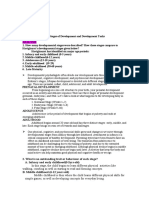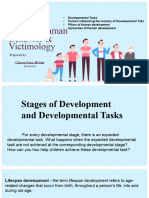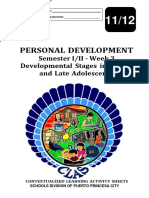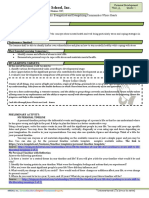0 ratings0% found this document useful (0 votes)
26 viewsQuarter 1 Module 3
Quarter 1 Module 3
Uploaded by
Tete BearCopyright:
© All Rights Reserved
Available Formats
Download as PPTX, PDF, TXT or read online from Scribd
Quarter 1 Module 3
Quarter 1 Module 3
Uploaded by
Tete Bear0 ratings0% found this document useful (0 votes)
26 views39 pagesCopyright
© © All Rights Reserved
Available Formats
PPTX, PDF, TXT or read online from Scribd
Share this document
Did you find this document useful?
Is this content inappropriate?
Copyright:
© All Rights Reserved
Available Formats
Download as PPTX, PDF, TXT or read online from Scribd
Download as pptx, pdf, or txt
0 ratings0% found this document useful (0 votes)
26 views39 pagesQuarter 1 Module 3
Quarter 1 Module 3
Uploaded by
Tete BearCopyright:
© All Rights Reserved
Available Formats
Download as PPTX, PDF, TXT or read online from Scribd
Download as pptx, pdf, or txt
You are on page 1of 39
QUARTER 1 MODULE 3
Developmental Tasks According to Developmental
Stages
Objectives:
At the end of the lesson, the students should be able to:
1. discuss developmental tasks and challenges being experienced
during adolescence EsP-PD11/12DS-Ic-3.1
2. evaluate one’s development through the help of significant people
around him/her (peers, parents.sibling, friends, teachers, community
leaders) EsP-PD11/12DS-Id-3.2
3. list ways to become a responsible adolescent prepared for adult
life EsP-PD11/12DS-Id-3.3
Lesson 1: Developmental Tasks
According to Developmental Stages
• According to John Santrock there are 8 developmental
stages in a life span development. His research focuses on
family processes and children psychosocial development.
The following are the stages of development;
PRENATAL PERIOD
Development happens quickly during this stage
(tremendous growth from a single cell to an organism
complete with brain and behavioral capabilities)
Time between conception and birth
Divided into 3 stages: -germinal -embryonic –fetal
INFANCY
Birth to 18-24 months Time of extreme
dependence on adults
Many psychological activities are just beginning
( language, symbolic thought, sensori- motor
coordination & social learning)
EARLY CHILDHOOD
End of infancy to 5-6 years old (preschool years-
grade 1) Young children learn to become more self-
sufficient and care for themselves, develop school
readiness skills and spend many hours in play with
peers
MIDDLE & LATE CHILDHOOD
6-11 years old (elementary school years)
Fundamental skills of reading, writing, and arithmetic
are mastered
Child is formally exposed to larger world and its
culture
Achievement becomes a more central theme of the
child’s world and self-control increases
ADOLESCENCE
10-12 years old to 18-22 years old
Begins with rapid physical changes (dramatic gains in height in
weight, changes in body contour, and development of sexual
characteristics such as enlargement of breasts, development of
pubic and facial hair, deepening of voice)
Pursuit of independence & identity are prominent
Thought is more logical, abstract & idealistic
More time is spent outside family
EARLY ADULTHOOD
Late teens or early 20s to 30s
Time of establishing personal & economic
independence, career development, selecting a mate,
learning to live with someone in an intimate way,
starting a family & rearing children.
MIDDLE ADULTHOOD
40 to 60 years old time of expanding personal &
social involvement & responsibility
Assisting next generation in becoming competent
& mature individuals, reaching & maintaining
satisfaction in a career
LATE ADULTHOOD
60s and above
Time for adjustment to decreasing strength
and health, life review, retirement and
adjustment to new social roles
• Robert Havighurst identified six major age periods.
• Although many theorists are responsible for
contributing to the Developmental Tasks Theory, it
was Robert Havighurst who elaborated on this
development theory in the most systematic and
extensive manner.
• Robert Havighurst defines developmental tasks as
one that “arises at certain period in our life, the
successful achievement of which leads to happiness
and success with later tasks while failure leads to
unhappiness, social disapproval, and difficulty with
later task”. Havighurst, 1972)
•Infancy and early childhood (birth till 6
years old) -in this stage, the child begins to
learn different physical activities like walking,
crawling as well as starting to read and forming
concepts.
•Middle childhood (6-12 years old) -middle
childhood is then where the child learns
different physical skills for simple games; as
well as developing concepts for everyday
living.
•Adolescence (13-18 years old) -during the
adolescence period, the child achieves more
mature relations with others. The child gets to
knows oneself and prepares himself for the
coming years.
•Early adulthood (18-30 years old) -here one
is now ready to settle down and begin a family
as well as a new life. One looks for a career to
help in raising himself and his family;
practicing as well socially
• Middle age (30-60 years old) - the middle age, is
where one is able to see clearly to his future, here
one is then able to help his children as well as other
teenagers to become more responsible. Here one
also is able to adapt to everything that is happening
to him physically, emotionally even socially
•Later maturity (60 years old and over) - in
this stage, one is adjusting to the happenings of
his life. Here, one needs to adjust to understand
everything especially in death
ACTIVITY 1: MY DEVELOPMENTAL
STAGES PHOTO GALLERY
• Collect photos of your growing up years. If you don’t have
a picture during a certain stage draw a symbol to represent
you. Make a gallery of your pictures according to the 8
stages of developmental stage by Santrock. Label each
picture and put a little caption to describe your milestones.
You may ask your help from you parents and or older
family member to help put a description in your picture.
• 1. FALSE
• 2. TRUE
• 3. TRUE
• 4. FALSE
• 5. FALSE
• 6. TRUE
• 7. FALSE
• 8.FALSE
• 9. TRUE
• 10. FALSE
• 11. Robert Havighurst
• 12. John Santrock
• 13. Germinal
• 14. Embryonic
• 15. Fetal
• 16. Early childhood
• 17. Late Adulthood
• 18. Adolescence
• 19. Late teens or early 20’s to 30’s
• 20. Infancy
• 21. 6 developmental stages
• 22. Conception
• 23. Middle Adulthood
• 24. 8 developmental Stages
• 25-30. Developmental Stages of Robert Havighurst (in order)
ACTIVITY 2: CHECK MATE
Put a check (/) beside those statements that are correct and an (X)
beside those that are wrong. If your answer is an X explain why.
________1. Developmental tasks are only for the first 3 stages of
human development.
________2. Failure of achieving developmental tasks in an earlier
stage means failure for the learner to master developmental task in
the next level.
________3. Preschool age corresponds to early
childhood stage.
________4. Adolescence is middle and late
childhood stage.
________5. Teenage is middle childhood.
________6. Mastery of fundamental skills is a major
concern during early childhood.
________7. Play is a great need of children in middle
childhood.
________8. Preparing children for school readiness is
the major concern of middle childhood
________9. More time is spent outside family for
adolescent stage.
________10. In early childhood one developmental
task is learning to distinguish right from wrong and
developing a conscience.
Lesson 2: DEVELOPMENTAL TASK AND
CHALLENGES BEING EXPERIENCE
DURING ADOLESCENCE
• Adolescents have one foot in childhood and one foot
in adulthood.
• A developmental task represents our culture's
definition of “normal" development at different
points in the life span.
• The many developmental tasks facing adolescents
are challenging, but they are achievable.
• Adolescents are getting their first taste of
independence, yet they are not, and do not want to
be, totally independent.
• Parents and adults need to provide a supportive
environment in which adolescents may discover and
explore their identities.
What Are the Developmental Tasks
Facing Adolescents?
• Achieving mature relations with both sexes
• Achieving masculine or feminine social role
• Accepting one’s physique
• Achieving emotional independence of adults
• Preparing for marriage and family life
• Preparing for an economic career
• Acquiring values and an ethical system to guide
behavior
• Desiring and achieving socially responsible behavior
Ways to become a Responsible
Adolescent Prepared for Life
The following are eight (8) simple rules which could help you,
teenagers, to become a responsible adolescent prepared for
adult life:
1. Focus on your studies and do well in all of your endeavors.
There is time for everything.
2. 2. Take care of your health and hygiene. Healthy body and
mind are important as you journey through adolescence.
3. Establish good communication and relation with your
parents or guardian.
4. Think a lot before doing something. Evaluate probable
consequences before acting. Practice self-control and self-
discipline.
5. Choose to do the right thing. There are plenty of
situations in which it is better to use your mind rather than
your heart.
6. Do your best to resist temptations, bad acts, and
earthly pleasures and commit to being a responsible
adolescent.
7. Respect yourself. You are an adult in the making.
Do not let your teenage hormones get into you. If you
respect yourself, others will respect you too.
8. Be prepared to be answerable or accountable for
your actions and behavior. It is a part of growing up
and becoming an adult.
10 TASKS FOR ADOLESCENT
DEVELOPMENT
• Adjust to sexually maturing bodies and feelings
• Develop and apply abstract thinking skills
• Develop and apply new perspective on human
relationships
• Having learned to “put themselves in another person’s shoes
• Develop and apply new coping skills in areas such as
decision making, problem solving, and conflict resolution.
• Identify meaningful moral standards, values, and belief
systems.
• Understand and express more complex emotional
experiences.
• Form friendships that are mutually close and supportive.
• Establish key aspects of identity.
• Establish key aspects of identity.
• Meet the demands of increasingly mature roles and
responsibilities.
• Renegotiate relationships with adults in parenting
roles.
1.Being in Grade 11, what are the developmental tasks
expected of you? Rate yourself from 1-10 (10 as the
highest) on whatever you have accomplished those
expected tasks.
2. As you are in Grade 11, you are in transition from high
school to college, from being an adolescent to young adult.
How do you feel about this transition?
3. Do you think you are ready for this transition which may
mean more responsibilities and greater accountability? If
not what are the expected tasks you need to work on? If yes,
what are the ways to take so you can better plan for the
future?
You might also like
- Chapter 3 - Developmental Stages of LifeDocument31 pagesChapter 3 - Developmental Stages of LifeKean LeeNo ratings yet
- A PPT in Perdev Sy 2024 2025 Week 4 Lesson 6Document60 pagesA PPT in Perdev Sy 2024 2025 Week 4 Lesson 6Franz EbzNo ratings yet
- Personal Development Quarter 1 - Module 3: Developmental Changes in Middle and Late AdolescenceDocument55 pagesPersonal Development Quarter 1 - Module 3: Developmental Changes in Middle and Late AdolescenceCarla Joy PatiñoNo ratings yet
- Santrock Report SCRATCHDocument23 pagesSantrock Report SCRATCHAngela YaraNo ratings yet
- DO - PERDEV 11 - Q1 - Mod3Document11 pagesDO - PERDEV 11 - Q1 - Mod3Ruben100% (3)
- Child and Adolescent Development Facilitating LearningDocument362 pagesChild and Adolescent Development Facilitating LearningKenneth Myro GarciaNo ratings yet
- Lesson 3 Developmental Stages in Middle and Late AdolescenesDocument21 pagesLesson 3 Developmental Stages in Middle and Late AdolescenesalarconeuniseyllizaNo ratings yet
- Benlac Subject - Stages of Development and Developmental TasksDocument2 pagesBenlac Subject - Stages of Development and Developmental TasksCherry DerramasNo ratings yet
- PROFED-1 MODULE 2 The Stages of Development and Development TasksDocument5 pagesPROFED-1 MODULE 2 The Stages of Development and Development TasksKaren Felipe100% (10)
- Child & Adolescent DevtDocument60 pagesChild & Adolescent DevtJenniferNo ratings yet
- Per Dev Module 3 PPT 3Document51 pagesPer Dev Module 3 PPT 3SHERWIN JOY DE LA CRUZNo ratings yet
- Topic Personal DevelopmentDocument7 pagesTopic Personal DevelopmentSteffNo ratings yet
- Theories of Human Development: Sadia Bashir M.A, M.Phil (ELM), M.Phil (Education)Document32 pagesTheories of Human Development: Sadia Bashir M.A, M.Phil (ELM), M.Phil (Education)Hafsa YaseenNo ratings yet
- T3 (Developmental Tasks)Document26 pagesT3 (Developmental Tasks)charengono15No ratings yet
- Developmental Tasks According To Developmental Stages Lesson 3 Group 2Document22 pagesDevelopmental Tasks According To Developmental Stages Lesson 3 Group 2Shelina Obnimaga100% (1)
- PERDEV Presentation Group 3Document49 pagesPERDEV Presentation Group 3Elle CasilNo ratings yet
- 3 Stages of Human DevelopmentDocument57 pages3 Stages of Human DevelopmentKaren FalsisNo ratings yet
- Presentation 1Document23 pagesPresentation 1joshua herreraNo ratings yet
- The Stages of Development and Development Task: Answer The Questions Under ANALYSIS NOS. 1 - 5Document15 pagesThe Stages of Development and Development Task: Answer The Questions Under ANALYSIS NOS. 1 - 5Alejah Mae Madrideo AgananNo ratings yet
- Developmental StagesDocument21 pagesDevelopmental StagesRizalyn Quillosa100% (1)
- Developmental TaskDocument4 pagesDevelopmental TaskPriyanka SahNo ratings yet
- PERDEV Developmental ChangesDocument20 pagesPERDEV Developmental ChangesJohn Christuff VillarazaNo ratings yet
- YiieDocument8 pagesYiieAna ReyesNo ratings yet
- Edchad AllDocument440 pagesEdchad AllChristian Lyn PalmaNo ratings yet
- Developmental Stages in Middle and Late AdolescenceDocument19 pagesDevelopmental Stages in Middle and Late AdolescenceHalley SuingNo ratings yet
- Report Kinshen GallenoDocument34 pagesReport Kinshen GallenoDiana SantianezNo ratings yet
- Developmental ChangesDocument10 pagesDevelopmental ChangesGissele AbolucionNo ratings yet
- Personal Development and Self KnowledgeDocument33 pagesPersonal Development and Self KnowledgeEman SimsuangcoNo ratings yet
- Module 3Document6 pagesModule 3aeiaeiuaoNo ratings yet
- Lesson 3 - Developmental Stages in Middle AdolescenceDocument31 pagesLesson 3 - Developmental Stages in Middle AdolescenceCielo CaballesNo ratings yet
- PERDEV Week3Document26 pagesPERDEV Week3Coulline DamoNo ratings yet
- Per Dev 3 New ModuleDocument7 pagesPer Dev 3 New Modulesheridan dimaanoNo ratings yet
- Developmental Stages in Middle and Late AdolescenceDocument41 pagesDevelopmental Stages in Middle and Late AdolescenceMilcah Roselle Canda100% (1)
- ModsDocument18 pagesModsRen SabueroNo ratings yet
- Stages of Learner Across LifespanDocument24 pagesStages of Learner Across Lifespanmarvin pulaoNo ratings yet
- Module 1 Concept of Growth and DevelopmentDocument34 pagesModule 1 Concept of Growth and DevelopmentElvis Quitalig100% (2)
- Personal Development Challenges of Middle and Late AdolescenceDocument33 pagesPersonal Development Challenges of Middle and Late Adolescencedave lorenzeNo ratings yet
- Prof Ed 101: The Child and Adolescent Learners and Learning PrinciplesDocument11 pagesProf Ed 101: The Child and Adolescent Learners and Learning PrinciplesTeresita LeonidoNo ratings yet
- CORE - 11-12 - Personal Development - q0 - CLAS3 - Week3 - Developmental-Stages-in-Middle-and-Late-Adolescene - 2 - RHEA ANN NAVILLA PDFDocument18 pagesCORE - 11-12 - Personal Development - q0 - CLAS3 - Week3 - Developmental-Stages-in-Middle-and-Late-Adolescene - 2 - RHEA ANN NAVILLA PDFKaren Ann ParangueNo ratings yet
- MOCK-BOARD ExamDocument78 pagesMOCK-BOARD ExamAurea Jasmine DacuycuyNo ratings yet
- Per - Dev Lesson 23Document70 pagesPer - Dev Lesson 23Cabaral Ashley RussellNo ratings yet
- Child and Ado1Document26 pagesChild and Ado1Jeremy CarpioNo ratings yet
- Perdev Reviewer 4Document7 pagesPerdev Reviewer 4Jean DaclesNo ratings yet
- Personal DevelopmentDocument49 pagesPersonal DevelopmentJohn Gemil JavierNo ratings yet
- Personal Development 11 - Q1 - LAS - Week3Document8 pagesPersonal Development 11 - Q1 - LAS - Week3Ruben Rosendal De Asis100% (2)
- Developmental Stages and Tasks Havighurst and SantrockDocument3 pagesDevelopmental Stages and Tasks Havighurst and Santrockjoan arreola80% (5)
- PerDev FOR SENDINGDocument17 pagesPerDev FOR SENDINGYamyam ToscoNo ratings yet
- Module 4-Developmental TasksDocument14 pagesModule 4-Developmental TasksKimberly VergaraNo ratings yet
- Growth and DevelopmentDocument150 pagesGrowth and Developmentvicson_4No ratings yet
- Module 1 2 AdolescenceDocument33 pagesModule 1 2 AdolescencetijingtinayNo ratings yet
- Psychology and SociologyDocument20 pagesPsychology and SociologykwagalaenochkeaneNo ratings yet
- Unit OneDocument12 pagesUnit OnebenabiceitianNo ratings yet
- Foundations - Chapter 1 - Psychology PPT 2022Document53 pagesFoundations - Chapter 1 - Psychology PPT 2022fekadumekdelawit428No ratings yet
- Periods of Development1Document21 pagesPeriods of Development1Princess Jean PayotNo ratings yet
- Tcallp Module 2,3,4, & 13 Bsed Sstu - 1102Document43 pagesTcallp Module 2,3,4, & 13 Bsed Sstu - 1102Shiena Mae Delgado Racaza100% (2)
- Physical Develpment TheoryDocument18 pagesPhysical Develpment TheoryTSL3-0620 Shanice Chin Ying XuanNo ratings yet
- Physical Develpment TheoryDocument18 pagesPhysical Develpment TheoryTSL3-0620 Shanice Chin Ying XuanNo ratings yet
- Per Dev Module New 5Document7 pagesPer Dev Module New 5sheridan dimaanoNo ratings yet
- Child and Adolescent Learners and LearningDocument10 pagesChild and Adolescent Learners and LearningMercy AbaretaNo ratings yet
- Dating , Mate Selection, Mariage, Love & Family: How to Get the Most Out of Life and Achieve SuccessFrom EverandDating , Mate Selection, Mariage, Love & Family: How to Get the Most Out of Life and Achieve SuccessNo ratings yet
- Case StudyDocument7 pagesCase StudyKhiel YumulNo ratings yet
- Media Literacy - EgyanDocument15 pagesMedia Literacy - EgyanDinamani SinghNo ratings yet
- Act Like AManDocument2 pagesAct Like AManAnne ManacmulNo ratings yet
- 273-Article Text-699-1-10-20230418Document10 pages273-Article Text-699-1-10-20230418R ShinvaniNo ratings yet
- By Jean V. Dickson and Scott Godfrey JVD Creativity ConsultingDocument3 pagesBy Jean V. Dickson and Scott Godfrey JVD Creativity ConsultingJuanLondonoNo ratings yet
- Trabajando Con La VergüenzaDocument27 pagesTrabajando Con La VergüenzaJacqui100% (1)
- The Rise and Fall of BehaviorismDocument41 pagesThe Rise and Fall of Behaviorismrupal aroraNo ratings yet
- Theory and History of OntologyDocument8 pagesTheory and History of Ontologyakms_Saif2521No ratings yet
- Leadership Styles and Employee Performance: Empirical Evidence From Selected Banks in Edo StateDocument15 pagesLeadership Styles and Employee Performance: Empirical Evidence From Selected Banks in Edo StatemeseretNo ratings yet
- English 5 q4Document6 pagesEnglish 5 q4Lemuel MoradaNo ratings yet
- Bakhtin Group ProjectDocument6 pagesBakhtin Group Projectapi-288116330No ratings yet
- 1 - Introduction To Impact Evaluation PDFDocument21 pages1 - Introduction To Impact Evaluation PDFkarolina_siahaan15No ratings yet
- The Problem and Its BackgroundDocument23 pagesThe Problem and Its BackgroundGladys Avila100% (2)
- Factors Influencing Disclosure of Domestic Violence Student's Name Institutional Affiliation Course DateDocument8 pagesFactors Influencing Disclosure of Domestic Violence Student's Name Institutional Affiliation Course DateMasila JohnNo ratings yet
- Lesson Plan EdmodoDocument3 pagesLesson Plan Edmodoapi-302334303No ratings yet
- Smith Criminal Feminist 1994Document65 pagesSmith Criminal Feminist 1994Estefanía Vela BarbaNo ratings yet
- Counselling ReviewerDocument2 pagesCounselling Reviewerirish xNo ratings yet
- Al Capone Does My Homework Full BookDocument6 pagesAl Capone Does My Homework Full Bookafmsneagp100% (1)
- College of Health & Allied Sciences: Review of Related LiteratureDocument20 pagesCollege of Health & Allied Sciences: Review of Related LiteratureAngela V. De LunaNo ratings yet
- 3.1 Emotional ScaleDocument3 pages3.1 Emotional Scaleionut307No ratings yet
- Abstract - Use of Interactive Visual Novel Game in Teaching Grade 8 PhysicsDocument1 pageAbstract - Use of Interactive Visual Novel Game in Teaching Grade 8 PhysicsJanine Faye TagardaNo ratings yet
- Developing Competency ModelDocument12 pagesDeveloping Competency ModelTheodore RockgrapherNo ratings yet
- Oral Maxillofac Surg Clin North Am v.b20, n.b02, May 2008Document164 pagesOral Maxillofac Surg Clin North Am v.b20, n.b02, May 2008Ledir Luciana Henley de AndradeNo ratings yet
- Performance Appraisal and Potential AppraisalDocument22 pagesPerformance Appraisal and Potential Appraisallovebassi75% (8)
- Psychosis and Shamanism in A Filipino American Immigrant - Hwang, Miranda, ChungDocument20 pagesPsychosis and Shamanism in A Filipino American Immigrant - Hwang, Miranda, Chung309beansNo ratings yet
- Peach and Blue Illustration English Class Education PresentationDocument18 pagesPeach and Blue Illustration English Class Education PresentationSiwaporn DanNo ratings yet
- What Is Organizational CommunicationDocument6 pagesWhat Is Organizational Communicationعبد الرحيم فاطميNo ratings yet
- Group 3 - Psychological Perspective of The SelfDocument8 pagesGroup 3 - Psychological Perspective of The SelfKEANNA RUBIANo ratings yet
- Science Notebook Scoring RubricDocument2 pagesScience Notebook Scoring RubricThomas FloresNo ratings yet
- ID Persepsi Siswa Tentang Perilaku Sosial Dalam Pacaran Studi Kasus Siswa Sma Al IsDocument11 pagesID Persepsi Siswa Tentang Perilaku Sosial Dalam Pacaran Studi Kasus Siswa Sma Al IsCarleone PrimaNo ratings yet

























































































